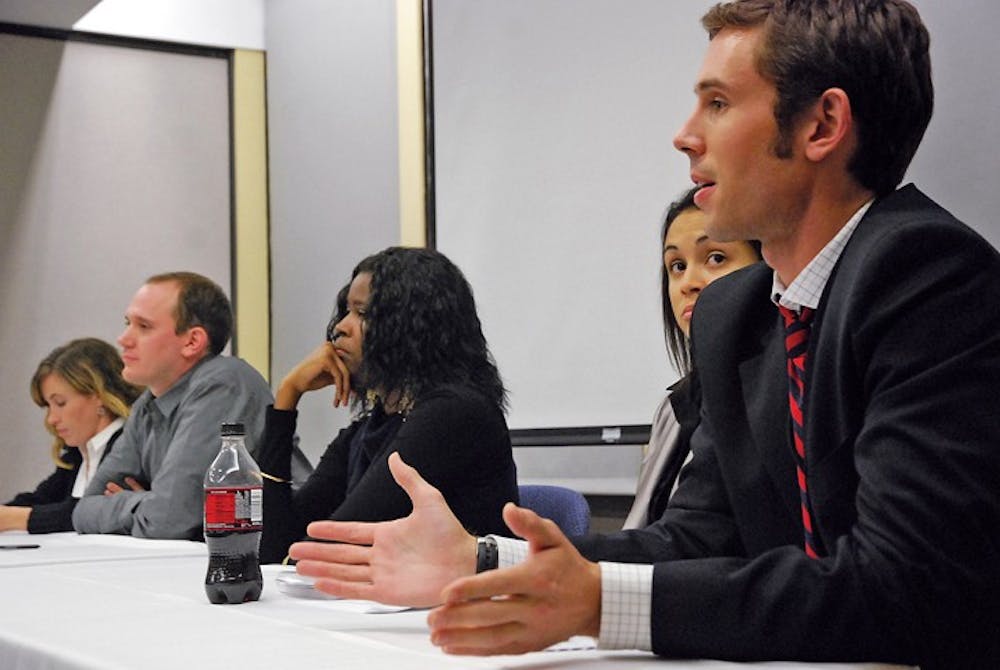Linking the salaries of D.C. public school teachers to the standardized test scores of their students is highly detrimental and fosters a test-driven learning environment, according to panelists at the “Savage Inequalities: A Close Look at D.C. Public Schools” event.
The panel, held Nov. 10, focused on the current status and conditions of DCPS and what can be done to change those conditions.
The panel started off with a Time magazine video entitled “Can She Save Our Schools?” about conditions in D.C. public schools and the recent work of D.C. Public Schools Chancellor Michelle Rhee. Rhee was appointed chancellor of D.C.’s 144 public schools by Mayor Adrian Fenty in June 2007.
In the two years that Rhee has been chancellor she has worked to institute changes to the DCPS system. She has shut down 23 schools and fired over 100 workers from the DCPS administration. She also fired 270 teachers and 36 principals, a move that sparked controversy and outrage among D.C. teachers.
However, Rhee says in an interview in the video that she thinks she has made positive changes to the D.C. school system. She says that she has continued support from Mayor Fenty and that scores on standardized tests have risen eight to 11 percent in elementary and high schools.
Panelist James Pearlstein, the founder and executive director of the D.C. Youth Power Network, said that on a recent visit to a school in Southeast he was “struck by how joyless the teaching was.” He said standardized testing makes students disinterested and discourages them from being creative.
Sarah Otto, an English teacher at Anacostia High School, argued that standardized testing boxes students into one way of thinking and pushes the notion that school is just about numbers and answers. The moments that students remember most and learn from most are never from when they are being tested, she said.
Otto also said she was frustrated with the fact that teachers have to constantly struggle to communicate with the DCPS administration.
“We’re being told that things are happening, that they are making real changes, but that’s not what I see every day,” Otto said. “As a teacher, I feel like I’m screaming into the wind. There’s no one listening and I’m close to giving up.”
Stephanie Williams, the critical response team leader for Rhee, disagreed with Otto and said standardized testing helps schools understand how students are progressing.
“I don’t think standardized tests are the end-all, be-all of assessing students,” Williams said. “But there needs to be some measure of accountability and some way of proving that the kids are learning.”
Some members of the panel argued that D.C. schools are actually on an upswing and that the D.C. public school administration is doing a lot to help students. Williams praised the chancellor’s establishment of an Office of Youth Engagement. This office has a number of programs such as the Incarceration Program, which helps young adults recently released from prison transition back to school life, Williams said.
Panelist Sean Peterson, a former DCPS teacher who is currently an adjunct professor at AU, supported Williams’ positive outlook for D.C. schools by pointing out the improving conditions in some aspects of D.C. schools. There were over 300 suspensions in D.C. public middle schools last year, but only 75 suspensions this year, Peterson said.
The panel also discussed where blame should lie for the current state of the D.C. public school system. Peterson said the extra work placed on D.C. teachers to compensate for the failing school system is unfair. However, he said teachers should continue to have high expectations for their students and for themselves as teachers.
Williams did say DCPS teachers are not being paid enough for the extra effort they have to make in struggling schools but that having to do extra work is to be expected and is part of any profession.
Pearlstein put blame directly on the DCPS administration. He argued that “the farther away a person gets from the students, the more they get paid.” He also said the D.C. public school administration needs to do more to understand students on a personal level.
Peerry Ferrara, a freshman in the School of Communication, said that while she enjoyed the panel, she felt that more could have been said about the black community.
“There really wasn’t a discussion about black issues, like where we come from, where we are today and how this ties into D.C. public schools,” Ferrara said.
In D.C., 79 percent of students in public school are black.
She also said she felt that Williams and Peterson were not qualified enough to speak about the struggles of DCPS students.
“They seem to come from this big bureaucracy — they wore suits and had facts but they didn’t really seem to have a good grasp of what is going on for D.C. public school students,” Ferrara said.
Black Student Alliance, the Delta Sigma Theta Sorority and the Zeta Phi Beta Sorority hosted the panel.
You can reach this staff writer at jryan@theeagleonline.com.





